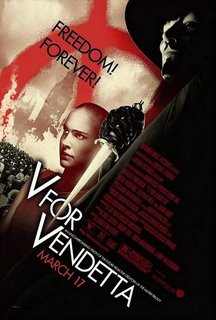V for Vendetta (and Vexing)

ATTN: Alan Moore
We, the United States of America, apologize. We apologize for The League of Extraordinary Gentleman. We Apologize for From Hell (which could have been SO cool, DAMN you Heather Graham!). And we apologize for V for Vendetta, although to a lesser extent. V has a lot more going for it as a film, but it still doesn't quite live up to its source. V for Vendetta is a movie of ideas, but few of those ideas are fully formed.
The film plays as a lighter, swashbuckling version of George Orwell’s 1984. Instead of Tyrone Power, however, we have Hugo Weaving (The Matrix, Lord of the Rings) as V, the masked terrorist hell bent on bringing down future England’s totalitarian regime. He is assisted by Evie (Natalie Portman), a young woman who gets dragged into the world of political radicalism after simply being in the wrong place at the wrong time. They are being followed by Eric Finch, a police inspector (Stephen Rea) who answers to the giant televised head of Chancellor Sutler (John Hurt). The biggest joy in this film is the performance of Stephen Fry as Dietrich, a talk show host who believes a little too strongly in the subversive powers of television.
The original "V for Vendetta" stories published in England by Warrior during the Thatcher administration and later in America by DC Comics, were created by Alan Moore (writer) and David Lloyd (artist) as a criticism of England’s Conservative Party.
Adapting the comics for the screen, writers Larry and Andy Wachowski (of Matrix fame) ask viewers to make connections between this future England and America under Bush. The script includes references to avian flu, secret "detention facilities" and political "rendition," a word rarely heard in that context before its recent association with the CIA practice of transporting terror suspects to countries that allow torture. To add to all of these details, we see that the torture victims in the film have black bags placed over their heads, ala Abu Ghraib.
The film remains somewhat faithful to its original source material, but only in the most superficial ways. The screenplay incorporates original dialogue with grace and panache. The sets, costumes and photography of the film are the most impressive and faithful part. V’s Shadow Gallery is almost identical to Lloyd's illustration, right down to his disco ball. McTeague manages to translate Moore’s “Valerie,” chapter well to the screen, depicting the moving story of a gay woman persecuted and killed by the government. In a film filled with forced and hollow pathos, this segment is probably the most affecting.
Unfortunately, the filmmakers miss the mark when it comes to the underlying themes of Moore’s work. The audience is force-fed the idea that V’s movement is right, rather than being allowed to decide for themselves. It is the moral ambiguity of V’s acts that make the story so interesting. The central theme of the series is the rationalization of carnage in the name of a higher purpose. The government’s higher purpose is to maintain stability; V’s higher purpose is to gain freedom.
One of the problems with adapting a work for the screen is that you often either have to change nothing or change everything. V for Vendetta changes enough to make its narrative suffer and its plot appear flimsy. For example, the comic had Inspector Finch dropping acid to reach his revelations; in the film, he simply has "feelings," that "tell him where to look." All in all, I was disappointed by Finch’s lack of development in the film. He is an interesting character and deserves better than a few throwaway lines. The focus is, instead, on Evie, who is intended to become the next anarchist in a long line of anarchists. Too bad she's too busy losing her battle with the English accent to wage war on anything else. The film takes a serious wrong turn in trying to implant a love story. When Evie grabs V while standing next to a subway car full of fertilizer and plastic explosives and says, “V, it’s not too late, we could run away together,” I just about wet myself with laughter. Her love for the idea of V might be understandable, but her love for V himself is unsupported by the rest of the film. It makes no sense, it stands out, it cheapens the whole thing.
V for Vendetta has some amazing photography of London and some truly spectacular explosions. That said, it is sorely lacking on the fight scenes. I love a good Matrix-style bullet-time hand-to-hand scene as much as the next lady, but V features such choppy and poorly photographed fight scenes that I was left wondering if I was missing something.
The movie is not so much about terrorism as it is about anarchy and revolution. However, as the French discovered in the 18th century, where does revolution end and terrorism begin? Rather than respecting its audience enough to leave us with that open-ended question, it simply tells us what we’re supposed to think. It’s enough to make you wonder who Big Brother really is.
Trivia: James Purefoy, who plays Guy Fawkes in the beginning of the film was the original casting choice for V. He left after 6 weeks of filming (no one will disclose why) but the filmmakers left the sequence as it was.
The amount of money I'd pay to see this: $5


0 Comments:
Post a Comment
<< Home